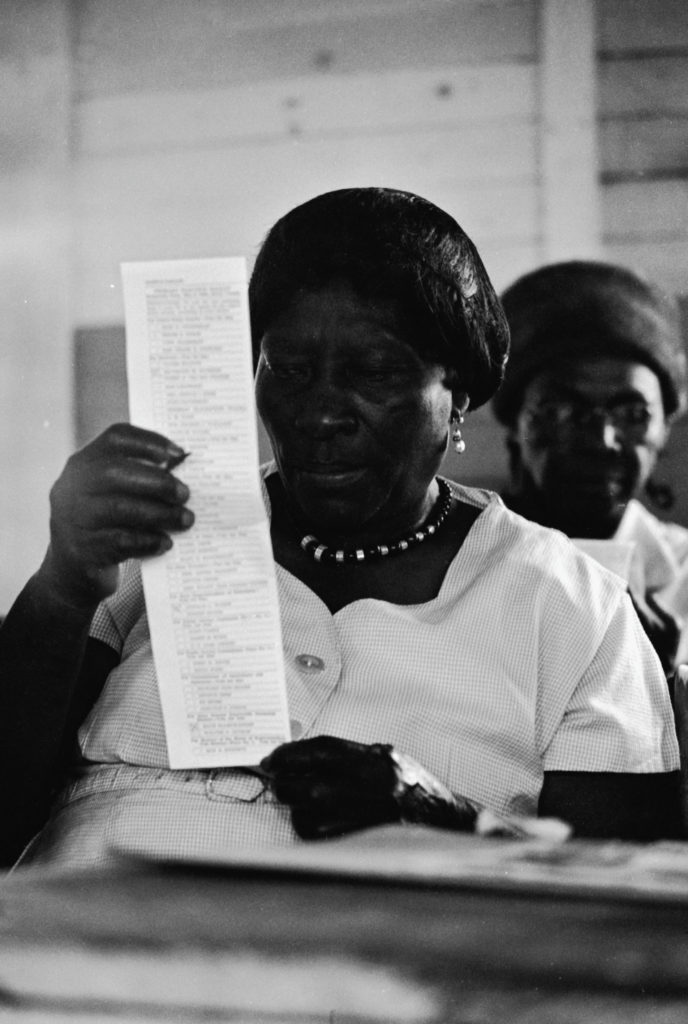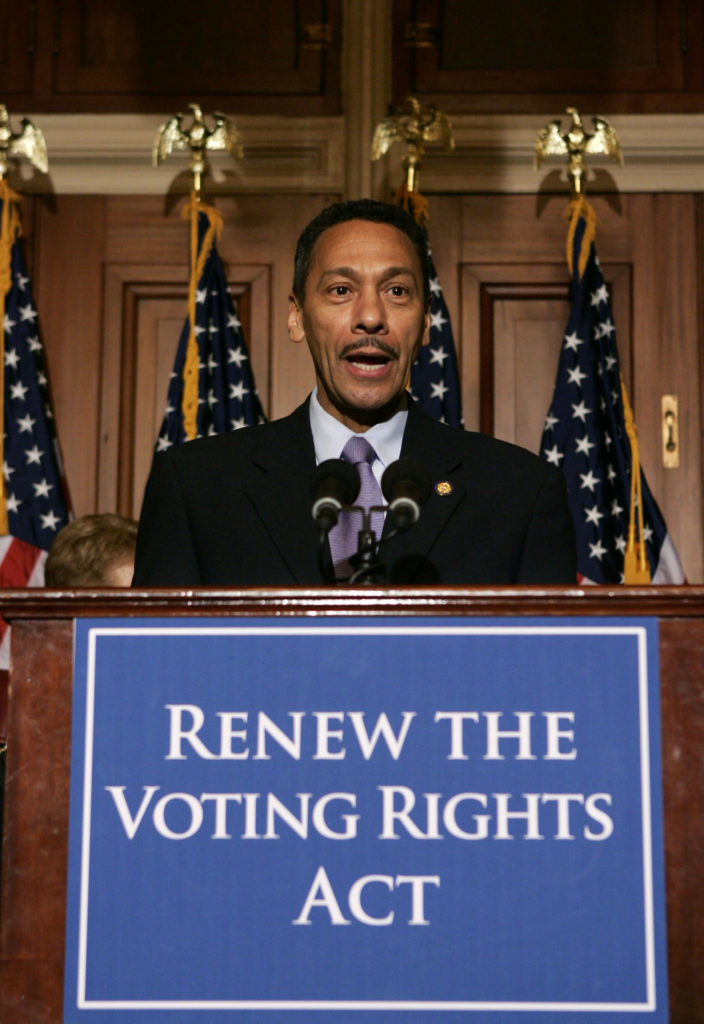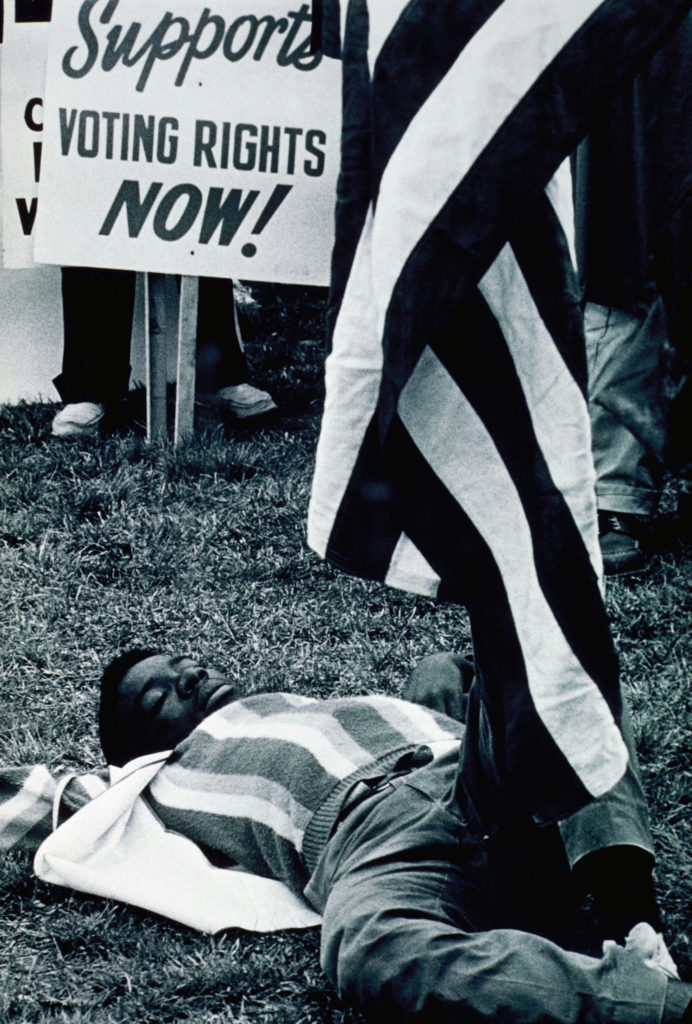Voting Rights Act: History
Learn how the CBC has spent years fighting tirelessly to protect the voting rights of underrepresented people.

Woman Looking at a Sample Voting Ballot
An African American woman reads a sample ballot during a class for new voters at an Alabama church. Civil rights groups held classes in Alabama and Mississippi about voting and registration after enactment of the Voting Rights Act.
On August 6, 1965, President Lyndon Johnson signed the Voting Rights Act (VRA) of 1965 into law. The law applied a nationwide prohibition against the denial or abridgment of the right to vote. The act contained special enforcement provisions targeted at those areas of the country where Congress believed the potential for discrimination to be the greatest. Prior to the passage of the Voting Rights Act, millions of African Americans had been denied the right to vote simply because of the color of their skin. Following the act, local and state jurisdictions were prohibited from using discriminatory practices, including “literacy” examinations, poll taxes, violence, and other methods of intimidation aimed at keeping Black Americans from the polls. Not only did such tactics make voting difficult, it also made it very difficult for African Americans to be elected to Congress.
While the right to vote as guaranteed in the VRA is permanent, some key sections of the Act are temporary. Since 1965, the Voting Rights Act has been amended several times. Black members of Congress have played important roles in the debate around VRA reauthorizations and have consistently worked to introduce and support policies that ensure all Americans have fair and equal opportunity to participate in the election process.
The initial amendments to the Voting Rights Act were added in the 1970s. In 1970, Congress extended Section 5 of the original Voting Rights Act. The purpose of Section 5 is to prevent voting rights violations before they occur. Section 5 focuses on the use of discriminatory tests or other devices designed to exclude certain individuals from the voting process. These extensions require that jurisdictions with a history of illegal discrimination obtain permission from either the Justice Department or a panel of federal district court judges before changing any voting practices. In 1975, the special provisions of the Voting Rights Act were extended for another seven years and were broadened to address voting discrimination against members of “language minority groups.” In addition, the 1965 definition of “test or device” was expanded to include the practice of providing election information, including ballots, only in English in states or political subdivisions where members of a single language minority constituted more than five percent of the citizens of voting age.
In 1982, Congress extended Section 5 of the VRA for twenty-five years. It also amended Section 2 of the VRA which prohibits voting qualificators based on race, color, or language-minority status to include the ban of any voting practice with discriminatory effect regardless of whether the practice was instituted with discriminatory intent or not. Sixteen CBC members showed their support for continuing VRA protections by signing on as co-sponsors to the House version of the amendments.
In 1992, Congress passed the Voting Rights Language Assistance Act to extend and expand Section203(c) of the VRA. Rep. Alan Wheat (D-MO) and other members of the CBC supported this act by co-sponsoring a resolution providing for the consideration of the bill to amend the Voting Rights Act of 1965 with respect to bilingual election requirements. This act’s provisions require bilingual voting materials, and it expands coverage to counties with more than 10,000 voting-age minority citizens who are not proficient in English. This provision provided an alternative coverage standard for Indigenous Americans and Alaskan Natives.
In 2002, Congress passed the Help America Vote Act, again with significant CBC support and co-sponsorship. The act was aimed at improving the administration of federal elections by providing assistance with the administration of certain federal election laws and programs. Since the passage of this legislation, several CBC members have introduced amendments designed to further improve the administration of federal elections in local and state jurisdictions.
Congress again began reconsideration of the VRA in the early 2000s as the expiration date set by the 1982 amendments neared. CBC members rallied to protect the Act. House Judiciary Committee Members Rep. John Conyers (D-MI), then the committee’s ranking member, and Rep. Melvin Watt (D-NC), then-CBC chair, worked closely with Judiciary Committee chair Rep. F. James Sensenbrenner Jr. (R-WI) to craft an extension that could garner bipartisan support. Many other CBC members signed on as co-sponsors to the resulting Fannie Lou Hamer, Rosa Parks, and Coretta Scott King Voting Rights Act Reauthorization and Amendments Act of 2006 and defended the bill on the House floor. Despite some opposition, President George W. Bush signed the bill into law thus reauthorizing the VRA for 25 more years.
The most recent major changes to the VRA came not from congressional debates about reauthorization, but from a series of rulings from the Supreme Court. In 2013, the Court ruled in Shelby County v. Holder that Section 4(b) of the VRA which determined preclearance as outlined in the 2006 VRA amendments was unconstitutional. This ruling opened the door for a number of states to pass laws such as new voter identification requirements that many Black members of Congress worried would make it more difficult to register and vote. In 2019, the Rucho v. Common Cause ruling found that partisan gerrymandering is a political question and not under the jurisdiction of federal courts. Then in 2021, the Court weakened Section 2 of the VRA through its Brnovich v. Democratic National Committee ruling which prioritized the state’s interest in hypothetical voter fraud over a minority group’s history of discrimination in a state. Black members of Congress, including Rep. Conyers and Rep. Terri A. Sewell (D-GA), introduced bills to update the VRA to meet the rising challenges to voting rights stemming from these decisions. Several of these attempts have passed in the House, including Rep. Sewell’s 2022 John R. Lewis Voting Rights Advancement Act.
Today, the CBC continues to work to pass the John R. Lewis Voting Rights Advancement Act to restore the full protections of the VRA and to support additional policies to expand access to the ballot for All Americans.


